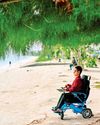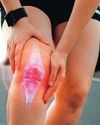
In July 2024, KIMSHEALTH in Thiruvananthapuram saw an unusual medical board meeting, as unusual as the case it was held for. "Before any complex surgery, we hold a medical board meeting where all specialists involved in the treatment, along with the administrative team, come together to review the case," says Dr Ranjith Unnikrishnan, consultant orthopaedics spine surgeon at KIMSHEALTH. "We discuss the pros and cons, outline anticipated risks, propose solutions and ensure the family fully understands the situation before obtaining their consent for surgery."
Typically, patients do not attend these meetings, with their family or caregivers representing them, says Unnikrishnan. But, in the case of Maldivian disability activist Mohamed Raishan Ahmed's surgery, Unnikrishnan insisted that the 23-year-old be present.
Raishan's condition stemmed from scoliosis caused by Spinal Muscular Atrophy (SMA) from birth, presenting several challenges. "SMA-related scoliosis is particularly complex," explains Unnikrishnan. "First, most patients with SMA don't survive this long due to the condition's severity. Those who do face significant limitations it doesn't affect the brain but severely impacts the locomotor system, leaving them unable to sit, stand or walk."
In Raishan's case, his hips were dislocated from childhood, and he had spent his entire life seated. Sitting upright was his primary functional need, but as his neuromuscular scoliosis progressed, it became increasingly difficult to manage with braces. The curvature of his spine had advanced to the point where braces could no longer hold him upright. Moreover, the braces caused pain and complications that made it impossible for him to sit without falling forward.
Diese Geschichte stammt aus der January 05, 2025-Ausgabe von THE WEEK India.
Starten Sie Ihre 7-tägige kostenlose Testversion von Magzter GOLD, um auf Tausende kuratierte Premium-Storys sowie über 8.000 Zeitschriften und Zeitungen zuzugreifen.
Bereits Abonnent ? Anmelden
Diese Geschichte stammt aus der January 05, 2025-Ausgabe von THE WEEK India.
Starten Sie Ihre 7-tägige kostenlose Testversion von Magzter GOLD, um auf Tausende kuratierte Premium-Storys sowie über 8.000 Zeitschriften und Zeitungen zuzugreifen.
Bereits Abonnent? Anmelden

Walking in pine forest can have the same effect as a prescription drug
INTERVIEW - KATHY WILLIS, professor of biodiversity, the University of Oxford, and author, Good Nature

MORE THAN A HELPING HAND
Maria Victoria Juan spent a lifetime healing wounded soldiers, and she can't think of anything she could have done better

Against all odds
Mohamed Raishan Ahmed was born with spinal muscular atrophy, which made him unable to sit, stand or walk. Recently, the Maldivian underwent a rare, complex surgery in India that now allows him to sit upright. At 23, the fact that he is alive is in itself an achievement. But he has gone beyond mere survival-with a pursuit of excellence

A pacemaker tale
From science fiction to reality, with a touch of southern Indian wisdom

Driving safe
Taxi drivers endure gruelling hours, cramped seats and relentless traffic, making them prime candidates for health issues like back pain, hypertension, diabetes and insomnia.

Good food, good life
From the moment of birth, we establish a relationship with food—a nourishing link that requires care and attention to stay healthy

POOR SLEEP IN MIDLIFE COULD AGE YOUR BRAIN FASTER
PEOPLE WHO EXPERIENCE SLEEP ISSUES, such as difficulty falling asleep or staying asleep in their 40s, may show more signs of brain ageing in late midlife. Poor sleep may accelerate brain atrophy that is associated with dementia.

BRAIN SCANS SHOW MINDFULNESS MEDITATION CAN REDUCE PAIN
CAN MINDFULNESS MEDITATION actually relieve pain, or is it just a placebo effect?

NON-SURGICAL OPTION TO EASE KNEE ARTHRITIS
A NEW, MINIMALLY INVASIVE procedure called genicular artery embolisation (GAE) can effectively reduce pain, improve quality of life and reduce progression of the disease and the need for knee replacement surgery in people with knee osteoarthritis.

EARLY ONSET DIABETES, BELLY FAT LINKED TO DEMENTIA
FACTORS SUCH AS DIABETES and belly fat in midlife can put you at risk of dementia and Alzheimer's disease later in life.